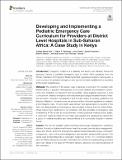developing and implementing a Pediatric emergency Care Curriculum for Providers at district level Hospitals in sub-saharan africa: a Case study in Kenya

View/
Publication Date
2017-12-11Author
Fant, Colleen D
Schwartz, Kevin R
Patel, Hiren
Fredricks, Karla
Nelson, Brett D
Ouma, Kennedy
Burke, Thomas F
Metadata
Show full item recordAbstract/
Introduction: Emergency medicine is a relatively new field in sub-Saharan Africa and dedicated training in pediatric emergency care is limited. While guidelines from the African Federation of Emergency Medicine (AFEM) regarding emergency training exist, a core curriculum in pediatric emergency care has not yet been established for providers at the district hospital level.
Methods: The objective of the project was to develop a curriculum for providers with limited training in pediatric emergencies and contain didactic and simulation components with emphasis on treatment and resuscitation using available resources. A core curriculum for pediatric emergency care was developed using a validated model of medical education curriculum development and thorough review of existing guidelines and literature. Based on literature review, as well as a review of existent guidelines in pediatric and emergency care, 10 core topics were chosen and agreed upon by experts in the field, including pediatric and emergency care providers in Kenya and the United States. These topics were confirmed to be consistent with the principles of emergency care endorsed by AFEM as well as complementary to existing Kenyan medical school syllabi. A curriculum based on these 10 core topics was created and subsequently piloted with a group of medical residents and clinical officers at a community hospital in western Kenya.
